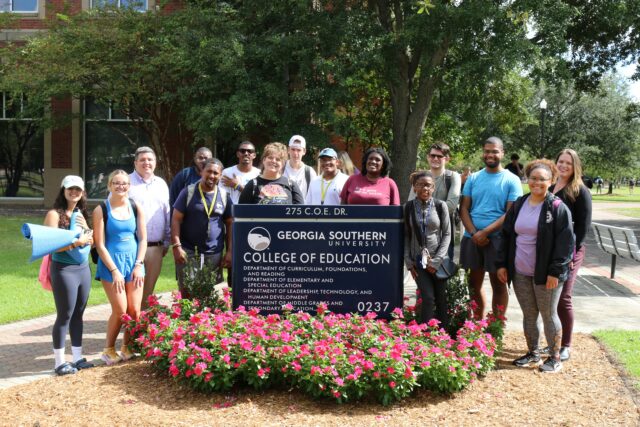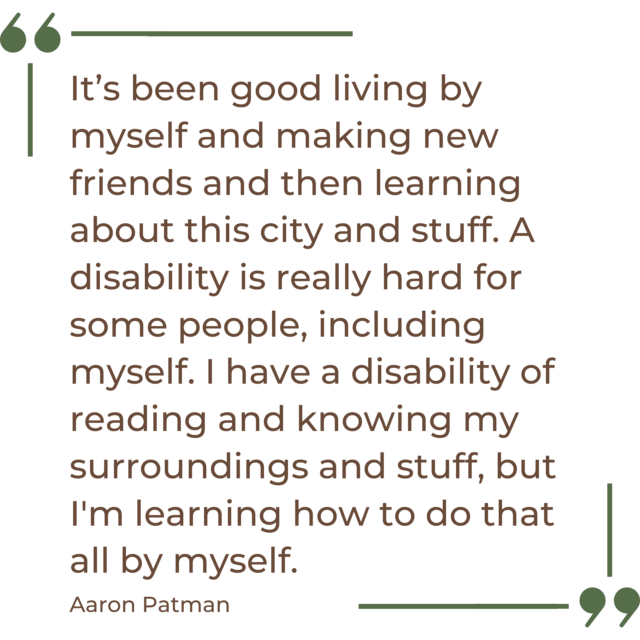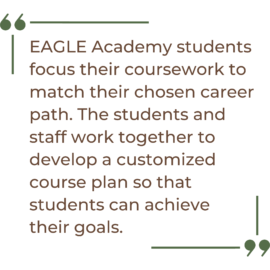
“I always told my parents I want an actual normal college life,” said Hannah White, a first-year student at the EAGLE Academy of Georgia Southern University in Statesboro, Georgia. “I want to get the actual experience of interacting with other people and making friends and stuff like that,” she added.
Thanks to the EAGLE Academy, White is getting just that — a normal college life.
The EAGLE Academy is a two-year program within Georgia Southern University that provides individuals with intellectual disabilities a chance to gain independence, skills, knowledge and confidence alongside students who do not have intellectual disabilities. The program currently focuses on years three and four of the college experience, meaning the students have either attended other post-secondary programs for one to two years, worked previously, or have been out of high school for a couple of years.
The ‘EAGLE’ in EAGLE Academy stands for Equal Access to Gainful Learning and Employment. It is one of the nine Inclusive Post Secondary Education (IPSE) programs in Georgia. Eagle Academy is rooted in the principles of independent living, meaning that everyone, including people with intellectual disabilities, has the right to make decisions about their own lives. This includes pursuing and participating in post-secondary education.
Dr. Stephanie Devine, EAGLE Academy’s executive director and an associate professor of special education at Georgia Southern University, explained, “The mission of our program is to provide an inclusive opportunity for individuals with intellectual disabilities who would not have been able to have a college experience via a typical route.”
Just like other college students, the EAGLE Academy students are active in all aspects of student and academic life. They live on campus, take college courses, eat at the cafeteria, work at jobs or internships, and have the option to join clubs and sports teams.
And, from the very first day, a team of dedicated staff is there to help ensure their success.
Devine said, “We’re looking at different ways to help improve whatever it is they’re looking to improve while they’re here on campus, and make sure that they’re successful in these settings — so looking at different academic supports, assistive technology, ways to just improve their basic reading, writing and math skills.”
During their time at the EAGLE Academy, students take both EAGLE Academy-specific courses and courses from the university’s existing course catalog. The IPSE classes are fully inclusive and allow students with and without intellectual disabilities to learn and grow together.
Even though not all IPSE programs can convert students’ certificates to non-audit credit hours, after completing the program, EAGLE Academy students receive a certificate of accomplishment and earn college credit that they can apply towards an associate’s or bachelor’s degree.
Living-Learning Community Builds Skills and Confidence
One of EAGLE Academy’s most important features is integrated housing. Just like all Georgia Southern University freshmen, EAGLE Academy students are required to live on campus. The EAGLE Academy students are housed in a living-learning community with Georgia Southern’s special education majors, which encourages peer support and interaction.
Known as the Eagle Educators Living-Learning Community, the unique setup creates a cohort of students who benefit from living near each other. Georgia Southern’s special education majors are positioned to live with students with intellectual disabilities, giving them real-life experience. And the EAGLE Academy students have supportive neighbors to answer questions, provide guidance, increase social skills and build independent living skills.
“We see our students in their first semester and then we see them towards the end of the semester,” said Nicholas Roshkind, EAGLE Academy Program Director. “The growth of living independently, we see it in the students. They’re coming to us telling us, ‘I was able to go to the [gym] on my own, or I was able to go here with my roommates.’ We see those independent living skills of learning how to live with someone. All of our students are doing the same thing that any other undergraduate student’s experiencing — living away from home, learning how to use the laundry facilities, roommate issues, they’re all dealing with that.”
Aaron Patman, a first-year EAGLE Academy student, gained confidence in his social skills and his ability to navigate his surroundings.
“It’s been good living by myself and making new friends and then learning about this city and stuff,” he said. “A disability is really hard for some people, including myself. I have a disability of reading and knowing my surroundings and stuff, but I’m learning how to do that all by myself.”
Peer Mentor Program Aids Academic and Social Interactions
Within the supportive environment of Georgia Southern University, students without intellectual disabilities can volunteer to be peer mentors for the EAGLE Academy students. Peer mentors sometimes go to class with EAGLE Academy students to support their learning, understanding and assignments.
Thanks to peer support and growing confidence, White felt confident to participate in class for the first time since starting at the EAGLE Academy.
She explained, “So for the first time today, [I was] actually participating in class, which I normally didn’t do because it was a little overwhelming at first, but [the professor] is really sweet. I feel like everybody in the room makes it a lot calmer because you see everybody is nice and are willing to be included with you, talk and have conversation.”
Peer mentors also help with social and practical experiences like taking students to lunch or to Walmart.
Emma Marshall is a second-year peer mentor who is hard-of-hearing. She felt drawn to the program as a way to use her experience to support EAGLE Academy students.
“My role is to help these students and guide them, not only educationally, but also in a social aspect,” she said. “It’s about us growing off of each other and figuring out what each other likes, and getting to spend time with them, and do things with them that’s not just school. Because school is important and it teaches you a lot, but these social interactions are also very, very important.”
Peer mentors and EAGLE Academy students also spend time simply enjoying each other’s company.
Kendall Faulk, a first-year peer mentor and a junior at Georgia Southern, shared her expectations.
“I was just expecting to help them with their class and stuff, but I’ve been surprised that it just feels like I’m hanging out with my friends while I’m doing it,” said Faulk. “That’s my favorite part of my day is doing this. After, I have to go to class and I’m like, ‘Ugh, I wish I could just stay here all day and hang out!’”
Career Exploration and Individualized Plans Help Students Succeed
In their first semester, EAGLE Academy and Georgia Southern University students take a course together focused on career exploration. With help from Georgia Southern special education majors, EAGLE Academy students create resumes and cover letters, and practice interviews. They also take aptitude tests that help guide their career choices.
“My career class is helping me,” explained Patman. “What I should do after college — I might become a teacher or an artist because I’ve been doing a good little drawings of cartoons and stuff. I keep on having these good ideas that come into my head, and I like to draw that.”
 After the first semester, EAGLE Academy students focus their coursework to match their chosen career path. The EAGLE Academy students and staff work together to develop a customized course plan so that students can achieve their goals.
After the first semester, EAGLE Academy students focus their coursework to match their chosen career path. The EAGLE Academy students and staff work together to develop a customized course plan so that students can achieve their goals.
“The really cool part about our program is, because it is individualized, all of our students are not going through the same classes their second semester and their second year,” explained Roshkind. “And so that’s really the fun part — finding out who’s wanting to do what.”
Malcolm, a graduate of the EAGLE Academy, wanted to become a football coach. Roshkind met Malcolm when Malcom was enrolled in both a psychology course and a sociology course to better understand how people think and act. Understanding his passion, Roshkind helped Malcolm target his goal more specifically.
Looking through the college course catalog, Roshkind found Georgia Southern courses on the fundamentals of coaching in football and in basketball. Malcolm loved the courses and gained new skills. And, when it came time to find a work opportunity, Roshkind helped Malcolm get a job at their campus gym. He started off cleaning the equipment and worked his way up to officiating many of the university’s club sports. Because he earned college credit through EAGLE Academy and Georgia Southern, Malcolm is qualified to become an assistant coach. After Malcolm graduated in spring of 2023, he moved home and is hoping to get an assistant coach position at his former high school.
Skills, Credits & Credentials Create a Launchpad for Accomplishing Dreams
It is clear that the EAGLE Academy’s community living, peer mentorship, career exploration and individualized coursework create a unique and inclusive program that brings students and teachers together to learn, grow and support one another.
As EAGLE Academy students earn their certificates and college credits, the program becomes a launchpad for accomplishing dreams. The story of Malcolm, now pursuing his dream of becoming a football coach, showcases the program’s tangible impact. The ripple effect extends beyond graduation as these individuals carry the skills and confidence gained at EAGLE Academy into the broader community.
In a world where inclusion is not just a buzzword, but a necessity, the EAGLE Academy stands as a testament to the transformative power of education when it is truly accessible to all. It’s a story of breaking barriers, nurturing potential, and building a future where every individual, regardless of ability, can spread their wings and soar.
